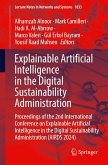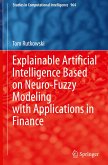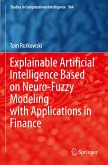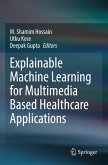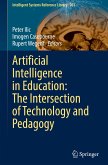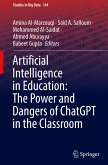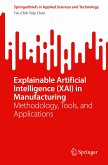Explainable AI for Education: Recent Trends and Challenges
Herausgegeben:Singh, Tanu; Dutta, Soumi; Vyas, Sonali; Rocha, Álvaro
Explainable AI for Education: Recent Trends and Challenges
Herausgegeben:Singh, Tanu; Dutta, Soumi; Vyas, Sonali; Rocha, Álvaro
- Gebundenes Buch
- Merkliste
- Auf die Merkliste
- Bewerten Bewerten
- Teilen
- Produkt teilen
- Produkterinnerung
- Produkterinnerung
"Explainable AI for Education: Recent Trends and Challenges" is a comprehensive exploration of the intersection between artificial intelligence (AI) and education. In this book, we delve into the critical need for transparency and interpretability in AI systems deployed within educational contexts.
Key Themes
Understanding AI in Education:
We provide a concise overview of AI techniques commonly used in educational settings, including recommendation systems, personalized learning, and assessment tools.
Readers will gain insights into the potential benefits and risks associated with…mehr
Andere Kunden interessierten sich auch für
![Explainable Artificial Intelligence in the Digital Sustainability Administration Explainable Artificial Intelligence in the Digital Sustainability Administration]() Explainable Artificial Intelligence in the Digital Sustainability Administration149,99 €
Explainable Artificial Intelligence in the Digital Sustainability Administration149,99 €![Explainable Artificial Intelligence Based on Neuro-Fuzzy Modeling with Applications in Finance Explainable Artificial Intelligence Based on Neuro-Fuzzy Modeling with Applications in Finance]() Tom RutkowskiExplainable Artificial Intelligence Based on Neuro-Fuzzy Modeling with Applications in Finance119,99 €
Tom RutkowskiExplainable Artificial Intelligence Based on Neuro-Fuzzy Modeling with Applications in Finance119,99 €![Explainable Artificial Intelligence Based on Neuro-Fuzzy Modeling with Applications in Finance Explainable Artificial Intelligence Based on Neuro-Fuzzy Modeling with Applications in Finance]() Tom RutkowskiExplainable Artificial Intelligence Based on Neuro-Fuzzy Modeling with Applications in Finance119,99 €
Tom RutkowskiExplainable Artificial Intelligence Based on Neuro-Fuzzy Modeling with Applications in Finance119,99 €![Explainable Machine Learning for Multimedia Based Healthcare Applications Explainable Machine Learning for Multimedia Based Healthcare Applications]() Explainable Machine Learning for Multimedia Based Healthcare Applications134,99 €
Explainable Machine Learning for Multimedia Based Healthcare Applications134,99 €![Artificial Intelligence in Education: The Intersection of Technology and Pedagogy Artificial Intelligence in Education: The Intersection of Technology and Pedagogy]() Artificial Intelligence in Education: The Intersection of Technology and Pedagogy127,99 €
Artificial Intelligence in Education: The Intersection of Technology and Pedagogy127,99 €![Artificial Intelligence in Education: The Power and Dangers of ChatGPT in the Classroom Artificial Intelligence in Education: The Power and Dangers of ChatGPT in the Classroom]() Artificial Intelligence in Education: The Power and Dangers of ChatGPT in the Classroom165,99 €
Artificial Intelligence in Education: The Power and Dangers of ChatGPT in the Classroom165,99 €![Explainable Artificial Intelligence (XAI) in Manufacturing Explainable Artificial Intelligence (XAI) in Manufacturing]() Tin-Chih Toly ChenExplainable Artificial Intelligence (XAI) in Manufacturing38,99 €
Tin-Chih Toly ChenExplainable Artificial Intelligence (XAI) in Manufacturing38,99 €-
-
-
"Explainable AI for Education: Recent Trends and Challenges" is a comprehensive exploration of the intersection between artificial intelligence (AI) and education. In this book, we delve into the critical need for transparency and interpretability in AI systems deployed within educational contexts.
Key Themes
Understanding AI in Education:
We provide a concise overview of AI techniques commonly used in educational settings, including recommendation systems, personalized learning, and assessment tools.
Readers will gain insights into the potential benefits and risks associated with AI adoption in education.
The Black-Box Problem:
AI models often operate as "black boxes," making it challenging to understand their decision-making processes.
We discuss the implications of this opacity and emphasize the importance of explainability.
Explainable AI (XAI) Techniques:
From rule-based approaches to neural network interpretability, we explore various methods for making AI models more transparent.
Examples and case studies illustrate how XAI can enhance educational outcomes.
Ethical Considerations:
As AI becomes more integrated into education, ethical dilemmas arise.
We address issues related to bias, fairness, and accountability, emphasizing responsible AI practices.
Future Directions:
Our book looks ahead, considering the evolving landscape of AI and its impact on education.
We propose research directions and practical steps to promote XAI adoption in educational institutions.
Key Themes
Understanding AI in Education:
We provide a concise overview of AI techniques commonly used in educational settings, including recommendation systems, personalized learning, and assessment tools.
Readers will gain insights into the potential benefits and risks associated with AI adoption in education.
The Black-Box Problem:
AI models often operate as "black boxes," making it challenging to understand their decision-making processes.
We discuss the implications of this opacity and emphasize the importance of explainability.
Explainable AI (XAI) Techniques:
From rule-based approaches to neural network interpretability, we explore various methods for making AI models more transparent.
Examples and case studies illustrate how XAI can enhance educational outcomes.
Ethical Considerations:
As AI becomes more integrated into education, ethical dilemmas arise.
We address issues related to bias, fairness, and accountability, emphasizing responsible AI practices.
Future Directions:
Our book looks ahead, considering the evolving landscape of AI and its impact on education.
We propose research directions and practical steps to promote XAI adoption in educational institutions.
Produktdetails
- Produktdetails
- Information Systems Engineering and Management 19
- Verlag: Springer / Springer Nature Switzerland / Springer, Berlin
- Artikelnr. des Verlages: 978-3-031-72409-1
- Seitenzahl: 320
- Erscheinungstermin: 28. November 2024
- Englisch
- Abmessung: 241mm x 160mm x 23mm
- Gewicht: 590g
- ISBN-13: 9783031724091
- ISBN-10: 3031724097
- Artikelnr.: 71461923
- Herstellerkennzeichnung Die Herstellerinformationen sind derzeit nicht verfügbar.
- Information Systems Engineering and Management 19
- Verlag: Springer / Springer Nature Switzerland / Springer, Berlin
- Artikelnr. des Verlages: 978-3-031-72409-1
- Seitenzahl: 320
- Erscheinungstermin: 28. November 2024
- Englisch
- Abmessung: 241mm x 160mm x 23mm
- Gewicht: 590g
- ISBN-13: 9783031724091
- ISBN-10: 3031724097
- Artikelnr.: 71461923
- Herstellerkennzeichnung Die Herstellerinformationen sind derzeit nicht verfügbar.
Dr. Tanu Singh is a highly liked professor at UPES, with a distinguished teaching career spanning over 7 years characterized by an unwavering commitment to excellence. She earned her Full-time PhD in Computer Science and Engineering from GGSIPU, New Delhi in 2022, following her Full-time MTech in CSE from PTU, Punjab in 2014, and her Full-time Graduation (BTech - IT) from PTU, Punjab in 2011. Proficient in Core Computer Science, software engineering, data analytics, and data warehousing, Dr. Singh has consistently showcased her proficiency in both teaching and research. Joining UPES in 2022, Dr. Singh has devoted herself to the advancement of education and research, embodying a deep-seated passion for nurturing the next generation of scholars. Her pedagogical approach is rooted in fostering continual growth and academic excellence among her students. With a robust academic background and over seven years of cumulative experience, she brings a wealth of knowledge and expertise to her role. Dr. Tanu Singh's contributions extend beyond the classroom, evidenced by her numerous publications, book chapters and patents. Her research endeavours cover a diverse array of topics, including data science, machine learning, and IoT, among others. Notably, her innovative ideas are not confined to theory; Dr. Singh has demonstrated her ability to translate concepts into practical solutions through her patent and design registrations. Committed to driving innovation and making meaningful contributions to her field, Dr. Singh remains dedicated to pushing the boundaries of knowledge and inspiring future generations. Dr. Soumi Dutta is Associate Professor at Sister Nivedita University, India. She has completed her Ph.D(CST), IIEST, Shibpur. She received her B.Tech(IT) and M.Tech(CSE) securing 1st position (Gold medallist), from MAKAUT. She is certified as Publons Academy Peer Reviewer, 2020 and Certified Microsoft Innovative Educator, 2020. Her research interests are Data Mining, Information Retrieval, Online Social Media Analysis and Image Processing. She has published 51 conference and journal papers in Springer, IEEE, IGI Global, Taylor & Francis etc. She has 17 Book in Palgrave Macmillian, Springer, IET and IGI Global. She is peer reviewer and TPC member in different international journals. She was the editor in CIPR 2020, CIPR2019, IEMIS 2020, CIIR 2021, IEMIS 2018, IEMIS 2022, ICIDA 2022, ICIDA 2023, CIIR 2023 and special issues in IJWLTT. She is the member of several technical functional bodies such as CSI, ACM, IEEE, IFERP, MACUL, SDIWC, Internet Society, ICSES, ASR, AIDASCO, USERN, IRAN, IAENG. She has published 7 patents and 1 Copyright. She has one Authored book in Elsevier. Dr. Soumi Dutta has delivered 39 Keynote talks in Different International Conferences. She has been awarded with Rashtriya Shiksha Ratna Award, InSc Research Education Excellence Award, International Teacher Award 2020-21 by Ministry of MSME, Government of India. Dr Sonali Vyas She is serving as an academician and researcher for more than 13 years. Currently, she is working as an Associate Professor in the School of Computer Science at University of Petroleum and Energy Studies, Uttarakhand. Her research interests include Healthcare Informatics, Data Analytics, Database Virtualization, Data Mining, and Big Data Analytics. She is a professional member of Senior Member-IEEE, ACM-India, CSI, IFERP, IAENG, ISOC, SCRS and IJERT. She has authored an ample number of research papers, articles and chapters in refereed journals/conference proceedings and books. She authored and edited many books like "Smart Health Systems", Springer and "Artificial Intelligence and Machine Learning Concepts", SIPH , "Blockchain Technology: Exploring Opportunities, Challenges, and Applications. CRC Press, Taylor & Francis Group", "Pervasive Computing: A Networking Perspective and Future Directions", Springer Nature and "Smart Farming Technologies for Sustainable Agricultural Development, IGI Global ". She acted as a guest editor in a special issue of "Machine Learning and Software Systems" in "Journal of Statistics & Management Systems (JSMS)" (Thomson Reuters)". She has also authored 4 patents in the research area of Smart and sustainable systems. She has also acted as a Resource Person in AICTE-ISTE Faculty Refresher Course on "Embedded Systems, IoT, Pervasive Computing" and delivered many talks reputed International and National Conferences. She is also a member of the Editorial Board and Reviewer Board in many referred National and International journals. She has also been a member of the Organizing Committee, National Advisory Board and Technical Program Committee at many International and National conferences. She has also Chaired Sessions at various reputed International and National Conferences. She has been awarded "Young Researcher Award 2022, by Universal Innovators Leadership Awards (UILA 2022)", "National Distinguished Educator Award 2021" and "International Young Researcher Award 2021", instituted by the "International Institute of Organized Research (I2OR) which is a registered MSME, Government of India" and Green ThinkerZ. Also awarded as "Women Researcher Award 2021", by VDGOOD Professional Association in International Conference on Award winners in Engineering, Science and Medicine. Also awarded as "Best Academician of the Year Award (Female)" in "Global Education and Corporate Leadership Awards (GECL-2018)". Álvaro Rocha was listed in 2023 as World's 1% Top Scientists by Stanford University and Elsevier, World's Top 0.05% Scientist by ScholarGPS, and World's Top 1% Scientist by ResearchGate for the fields of Information Science and Information Systems. He is Professor at ISEG, University of Lisbon, Invited Professor at University of Calabria, Honorary Professor at Amity University, President of ITMA - Information and Technology Management Association, Vice-Chair of IEEE SMC Portugal Chapter, and Book Series Scientific Manager at Springer-Nature. He holds the title of Honorary Professor, and holds a D.Sc. in Information Science, Ph.D. in Information Systems and Technologies, M.Sc. in Information Management, and BCs in Computer Science. He is researcher at the ADVANCE (the ISEG Centre for Advanced Research in Management), and a collaborator researcher at CINTESIS (Center for Research in Health Technologies and Information Systems). His main research interests are maturity models, information systems quality, online service quality, requirements engineering, intelligent information systems, e-Government, e-Health, and information technology in education. He is also Founder and Editor-in-Chief of both following Scopus and/or WoS journals: JISEM (Journal of Information Systems Engineering & Management) and RISTI (Revista Ibérica de Sistemas e Tecnologias de Informação / Iberian Journal of Information Systems and Technologies). Moreover, he has served as Vice-Chair of Experts for the European Commission's Horizon 2020 Program, and as an Expert at the COST - intergovernmental framework for European Cooperation in Science and Technology, at the European Commission's Horizon Europe Program, at the Government of Italy's Ministry of Universities and Research, at the Government of Latvia's Ministry of Finance, at the Government of Mexico's National Council of Science and Technology, at the Government of Polish's National Science Centre, at the Government of Cyprus's Research and Innovation Foundation, and at the Government of Slovak's Research Agency.
A path analysis model of responsible usage of AI and its effectiveness on the Quality of Education: Perspective from India.- Towards Trustworthy and Explainable AI Educational Systems.- Educational AI Tools: A new Revolution in Outcome-Based Education.- Intelligent AI Driven for Digital Citizenship and Eco-Literacy to Unravelling Social Systems in Environmental Education for sustainable learning.- Unveiling the Black Box: Exploring Explainable AI in Education - Trends, Challenges, and Future Directions.- Equitable Education and Sustainable Learning: A Literary Exploration Of Integration Of Artificial Intelligence In Education For SDGs Advancement.- A Study of the Histories of People for Gerontology through Steps of Artificial Intelligence in Text Book.- Supremely Explainable Artificial Intelligence (XAI) in Education 5.0: Articulating Constructive Alignment in Teaching Learning Practices.- ARTIFICIAL INTELLIGENCE IN THE TEACHING OF NATURAL SCIENCES ON THE THRESHOLD OF THE FIFTH INDUSTRIAL REVOLUTION.- Navigating the Evolving Landscape of Personalized Learning in AIED: Recent Trends and Innovations.- Reshaping Education through AI: A Progressive Model for Developing Economies.- Innovative Pedagogical Practices through the Development and Design of EFL Teaching Materials Tailored to Sustainability through AI in the Digital Revolution.- The Dynamic Impact of Neuroscience and Artificial Intelligence on Education.- Transformative Pedagogy: A Comprehensive Framework for AI Integration in Education.- AI-Powered Proctoring: Safeguarding Online Assessment in the Education 5.0.- An MTCNN-Based Attendance Monitoring System Powered by Inception-ResNet-v1.
A path analysis model of responsible usage of AI and its effectiveness on the Quality of Education: Perspective from India.- Towards Trustworthy and Explainable AI Educational Systems.- Educational AI Tools: A new Revolution in Outcome-Based Education.- Intelligent AI Driven for Digital Citizenship and Eco-Literacy to Unravelling Social Systems in Environmental Education for sustainable learning.- Unveiling the Black Box: Exploring Explainable AI in Education - Trends, Challenges, and Future Directions.- Equitable Education and Sustainable Learning: A Literary Exploration Of Integration Of Artificial Intelligence In Education For SDGs Advancement.- A Study of the Histories of People for Gerontology through Steps of Artificial Intelligence in Text Book.- Supremely Explainable Artificial Intelligence (XAI) in Education 5.0: Articulating Constructive Alignment in Teaching Learning Practices.- ARTIFICIAL INTELLIGENCE IN THE TEACHING OF NATURAL SCIENCES ON THE THRESHOLD OF THE FIFTH INDUSTRIAL REVOLUTION.- Navigating the Evolving Landscape of Personalized Learning in AIED: Recent Trends and Innovations.- Reshaping Education through AI: A Progressive Model for Developing Economies.- Innovative Pedagogical Practices through the Development and Design of EFL Teaching Materials Tailored to Sustainability through AI in the Digital Revolution.- The Dynamic Impact of Neuroscience and Artificial Intelligence on Education.- Transformative Pedagogy: A Comprehensive Framework for AI Integration in Education.- AI-Powered Proctoring: Safeguarding Online Assessment in the Education 5.0.- An MTCNN-Based Attendance Monitoring System Powered by Inception-ResNet-v1.


